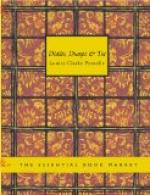And Ann, who had lived for several months in the camp, was delighted with her new home and the preparations that her little mistresses had made for her. The baby, too, laughed and clapped his hands over the toys the children gave him. His name was Henry, and a very pretty child he was. He was almost as white as Tot, and his black hair curled in ringlets all over his head; but, strange to say, neither he nor his mother gained favor with the negroes on the place.
Mammy said openly that she “nuver had no ’pinion uv white niggers,” and that “marster sholy had niggers ’nuff fur ter wait on ’im doutn buyen ’em.”
But, for all that, Ann and her little boy were quite happy. She was still sick, and could never be well, for she had consumption; though she got much better, and could walk about the yard, and sit in front of her door with Henry in her lap. Her devotion to her baby was unusual in a slave; she could not bear to have him out of her sight, and never seemed happy unless he was playing around her or nestling in her arms.
Mrs. Waldron, of course, never exacted any work of Ann. They had bought her simply to give her a home and take care of her, and faithfully that duty was performed. Her meals were carried from the table, and she had every attention paid to her comfort.
One bright evening, when she was feeling better than usual, she went out for a walk, and, passing Uncle Snake-bit Bob’s shop, she stopped to look at his baskets, and to let little Henry pick up some white-oak splits that he seemed to have set his heart on.
The old man, like all the other negroes, was indignant that his master should have purchased her; for they all prided themselves on being inherited, and “didn’t want no bought folks” among them. He had never seen her, and now would scarcely look at or speak to her.
“You weave these very nicely,” said Ann, examining one of his baskets. Uncle Bob looked up, and, seeing she was pale and thin, offered her a seat, which she accepted.
“Is this always your work?” asked Ann, by way of opening a conversation with the old man.
“In cose ’tis,” he replied; “who dat gwine ter make de baskits les’n hit’s me? I done make baskits ’fo mistiss wuz born; I usen ter ’long ter her pa; I ain’t no bort nigger myse’f.”
“You are certainly very fortunate,” answered Ann, “for the slave that has never been on the block can never know the full bitterness of slavery.”
“Wy, yer talkin’ same ez white folks,” said Uncle Bob. “Whar yer git all dem fine talkin’s fum? ain’t you er nigger same ez me?”
“Yes, I am a negress, Uncle Bob; or, rather, my mother was a slave, and I was born in slavery; but I have had the misfortune to have been educated.”
“Kin yer read in de book?” asked the old man earnestly.
“Oh yes, as well as anybody.”
“Who showed yer?” asked Uncle Bob.
“My mistress had me taught; but, if it won’t bother you, I’ll just tell you all about it, for I want to get your interest, Uncle Bob, and gain your love, if I can— yours, and everybody’s on the place— for I am sick, and must die, and I want to make friends, so they will be kind to my baby. Shall I tell you my story?”




